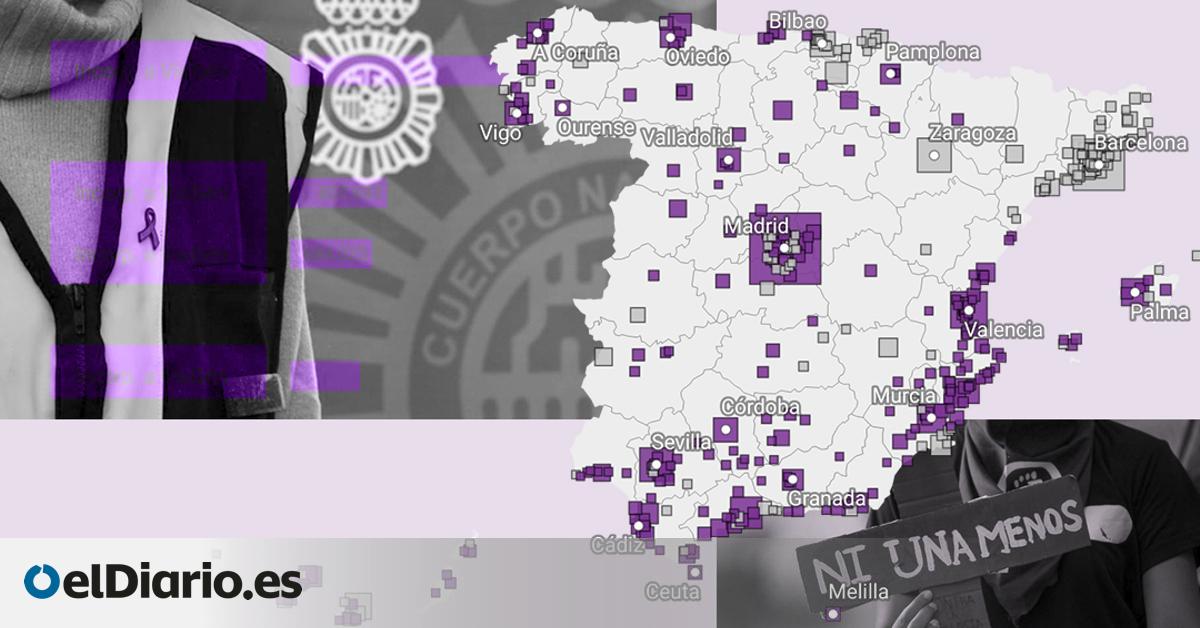
16 large Spanish cities do not have their local police or municipal services incorporated into the Comprehensive Monitoring System in cases of Gender Violence (VioGén). Zaragoza, Las Palmas de Gran Canaria, Cartagena, Albacete, Badajoz, Roquetas de Mar, Telde, Lugo, Cáceres, Toledo, Vélez-Málaga, Arona, Valdemoro, Coslada, Benalmádena, Santa Lucía de Tirajana, all with more than 50,000 inhabitants, They do not currently have a signed and valid agreement with the Ministry of the Interior to be part of this system, which allows coordinate both information on victims and aggressors and the protection of women depending on the level of risk that their case presents. This calculation does not include the municipalities of Catalonia and Euskadi, which have their own protection systems, although they are finalizing their interconnection with VioGén with the Interior.
What does it mean for a municipality to join VioGén? On the one hand, its local police assume functions of protection and monitoring of cases of gender violence whose risk level has been classified as medium, low or not appreciated and that are in that locality. But also that the local police and the corresponding municipal services of that city can immediately access (and contribute with their own reports or assessments) all the information about the case that is collected in VioGén.
Interior sources emphasize that in no case are women left unprotected: in town councils without an agreement with VioGén, it is the National Police or the Civil Guard who are in charge of protecting and monitoring the victims, although the incorporation of local forces implies have more resources and be able to divide them according to the risk of each case. However, not being attached to the system does harm the coordination between the different security forces, municipal services and the judicial system. It also means that information about the case may be less extensive or take longer to reach the person requesting it, which, in turn, affects the risk assessments made of the cases.
“Of course, being in VioGén is a recommendation that we make, it is a way for us to all be working in the same boat. Municipalities have a fundamental role, in social services and local police, because they serve victims and families closely and can incorporate a lot of very valid information into the system. Not being a member makes a more accurate assessment of the risk difficult, the information arrives less directly, it takes longer. With VioGén it is more effective,” explains the Government delegate against Gender Violence, Carmen Martínez Perza, who emphasizes that they are working to ensure that VioGén incorporates more and more information and facilitates the connection between different databases.
The Interior is working on a VioGén 2, which will collect some of the deficiencies and needs detected in the crisis committees that Irene Montero’s Ministry of Equality launched in the last legislature to analyze the murders when several accumulate in a short period of time. “After the committees we insisted a lot that the specialized services had the possibility of both consulting and including information,” says the former Government delegate against Gender Violence, Victoria Rosell.
In these meetings, a lack of coordination between different services or security forces was frequently detected, or that information that was valuable to evaluate the risk of the case was not included in the system or available to all the services involved. As a transition to VioGén 2, there is protocol 0, which will allow the system to include not only cases in which there is a complaint or conviction, but also in which there are signs of abuse after, for example, several police visits by calls. of the neighbors.
Rosell emphasizes the importance of coordination and centralizing information through VioGén: “It is a computer system that allows for more efficiency. If all the town councils, all the security forces and bodies, social services, health system are there… everyone will have more information to act.” For example, he continues, it will be known if there are changes of address between locations or if a woman is a user of a women’s center in a city other than the one in which she lives.
What the town councils say
The VioGén System was launched in 2007, three years after the comprehensive law against gender violence was approved, and it is not mandatory for localities to adhere to it. To join, cities and municipalities have to sign an agreement with the Interior that stipulates, among other things, how many personnel the city council will dedicate to monitoring cases and protecting women. There is no standard agreement, but it is adapted to the characteristics and needs of each place.
Zaragoza is the city with the largest population that is not integrated into VioGén. Although in 2019, the then mayor, Jorge Azcón, announced that the city council was going to join, the incorporation has not yet occurred. On a visit to the city in September, the Minister of Equality, Ana Redondo, urged Zaragoza to join: “Steps have been taken, but we need them to be more agile; Women need it. The delay in time is not understood. It is a question of political will.” The statements made the team of the current mayor, Natalia Chueca, feel bad. Councilor Ruth Bravo urged the minister to “learn well about the issue” and recalled that the city’s non-incorporation had been going on for a long time.
The scarcity of resources is one of the reasons usually given by municipalities without an agreement, which fear compromising many resources. The Government delegate against Gender Violence, Carmen Martínez Perza, insists that the agreements are “specific” for each municipality and that they adapt to their reality. His predecessor in office, Victoria Rosell, criticizes the argument put forward by some: “It is a question of awareness and mentality. There were those who put citizen security on one side of the scale and gender violence on the other, which means that it seems that women do not fit into that public security. If someone says ‘I can’t remove police officers from shoplifting and put them into gender violence’, it is not true; Yes, it can be done, if you govern with a gender perspective and want to govern for all women.”
From the city council of Las Palmas de Gran Canaria they assure that they continue negotiating with the Government Delegation the protocol to integrate into VioGén. “It is a negotiation in which both parties are interested in reaching an agreement, but in the case of large municipalities like ours it entails a more complex negotiation process. In any case, this does not imply that victims of gender violence are not being properly attended to,” say sources from the council, who highlight its comprehensive care system and its local protection and support unit, reports Jennifer Jiménez.
In another of the cities not affiliated with VioGén, Toledo, the team of the vice mayor and councilor for Citizen Protection, Inés Cañizares, from Vox, affirms that they are “waiting” for the Government subdelegation to send them the agreement to be able to sign it, Francisca Bravo reports.
Source: www.eldiario.es

